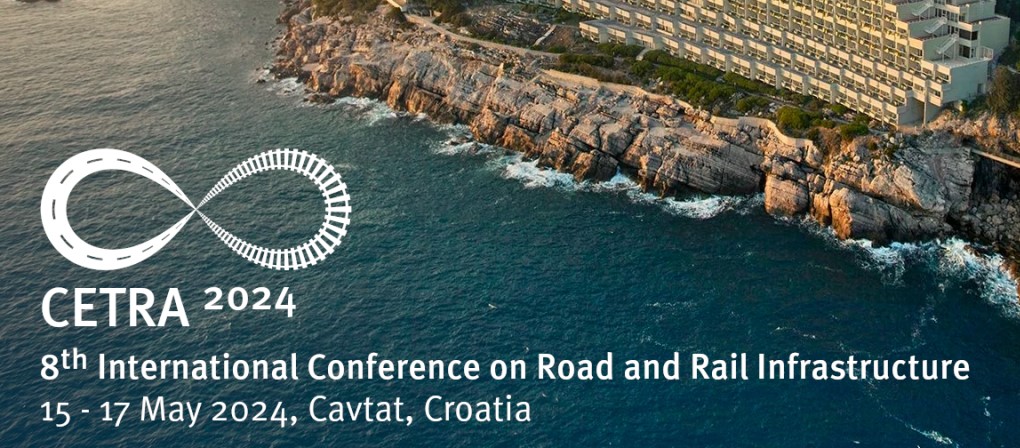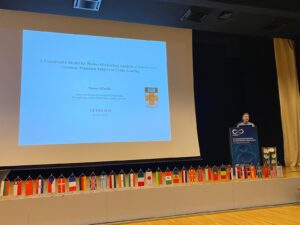RIIS Hub’s research and insights – related to improving the resilience of Australia’s Road and Rail infrastructure – reached a global audience at the 8th International Conference on Road and Rail Infrastructure conference in Croatia (CETRA 2024).
CETRA 2024 is a forum for connecting scientific and industry representatives, enabling discussion, dialogue and the exchange of ideas to solve issues associated with the road and rail sector.
Professor Nasser Khalili, RIIS Hub Director, gave the Keynote lecture, providing insights associated with developing ‘A Constitutive Model for Hydro-Mechanical Analysis of Granular Materials Subject to Cyclic Loading’.

About CETRA
The CETRA conference has established itself as a venue where scientific and professional information from the field of road and rail infrastructure is exchanged. The idea on linking research organisations and economic operators has been the guiding concept for the realisation of this conference. Conferences of this kind are undoubtedly a proper place for bringing closer together the economy and university operators, and for facilitating communication and establishing greater confidence that might result in cooperation on new projects, especially those that contribute to greater competition. Lectures organised in the scope of the conference are based on interesting technical solutions and on new knowledge from the field of transport infrastructure as gained on already realised projects, projects currently at the planning stage, and those now under construction, in all parts of the world. In addition to authors from the academic community, lectures were also presented by practical authors, the idea being to ensure the best possible synergy between the theory and practice.
Although the transport needs of nations around the world differ in detail, there is much benefit to be derived by sharing research findings and practical experience. CETRA Conference aims to provide a forum for dialogue on important issues across all disciplines and aspects of the road and rail sectors. The main gaps to be filled are those between researchers and practitioners in design, construction, maintenance, and management of transport infrastructure systems, especially regarding an increased need for sustainable and resilient transport systems – with minimum environmental impacts and able to withstand disruption and absorb disturbance by adapting to changing conditions, including climate change. CETRA 2024 attracted many papers and presentations from 39 countries and 136 institutions (from that 64 universities). More than 149 papers (from 208 submitted) were presented at the conference and are grouped together in the proceedings entitled Road and Rail Infrastructure Viii. The papers are conveniently divided into twelve chapters and one chapter regarding PhD students with extended abstracts.
UNSW RIIS Hub Student
 Mahdi Zakerzadeh also had his paper “Experimental Investigation on the Effect of Crumb Rubber on the Mechanical Behaviour of Stone Mastic Asphalt (SMA)” accepted for presentation to the program on Day 3 Friday 17th June supported by his Supervisor Dr Babak Shahbodagh
Mahdi Zakerzadeh also had his paper “Experimental Investigation on the Effect of Crumb Rubber on the Mechanical Behaviour of Stone Mastic Asphalt (SMA)” accepted for presentation to the program on Day 3 Friday 17th June supported by his Supervisor Dr Babak Shahbodagh
Abstract
The utilisation of crumb rubber through a dry process addresses the challenges of tyre recycling and promotes environmental sustainability. This study aimed to investigate the mechanical behaviour of the Crumb Rubber Stone Mastic Asphalt (CR-SMA) mixture. The response surface methodology (RSM) is adopted to explore the impact of independent variables, such as binder content, Crumb Rubber (CR) content, processing time, and CR size, on the variables controlling the mechanical response of the mixture. To comprehensively evaluate the data, the moisture susceptibility, resilient modulus, and fracture energy of the asphalt mixtures are studied using Analysis of Variance (ANOVA). The study successfully achieved an optimum CR-SMA mixture design by enhancing resistance to moisture damage, resilient modulus, and fracture energy, contributing to an improved understanding of the mechanical performance criteria. A quadratic polynomial model aligned with experimental results is proposed, providing reliable predictions of the material performance with an acceptable level of accuracy. These findings offer a valuable roadmap for future strategies in construction, maintenance, and rehabilitation, particularly within the domain of rubberised SMA pavements. Keywords: Stone Mastic Asphalt (SMA), Recycled tyre rubber, Response Surface Methodology (RSM), Dry-process, Rubberised asphalt mixture.
About PhD Session
This special session is organised to encourage PhD students to present their work to colleagues from the scientific and professional sectors. It provides an excellent opportunity for students to share their research ideas and methodologies with other students, to receive comments from experts from other fields of research, and to connect to a network that can be of great help to their profession. Session chairmen will be carefully selected to provide students support, guidance and advice in their research efforts.


